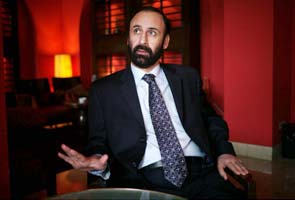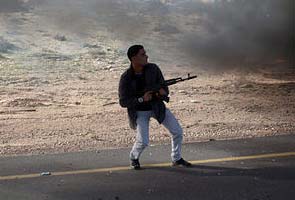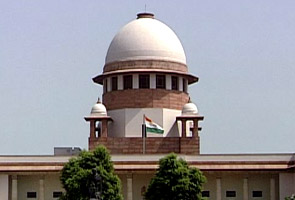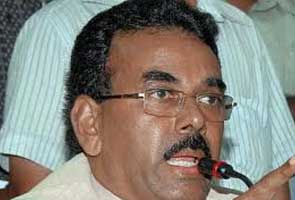Brega: From the feeble cover of sand dunes, under assault from a warplane overhead and heavy artillery from a hill, rebels in this strategic oil city repelled an attack by hundreds of Col. Muammar el-Gaddafi's fighters on Wednesday. The daylong battle was the first major incursion by the colonel's forces in the rebel-held east of the country since the Libyan uprising began.
(NDTV reports from inside Libya: Oil town fights off Gaddafi)The battle began at daybreak, when government fighters stormed the airport and the area around the city's oil refinery. By the early afternoon, hundreds of men from this city, wielding Kalashnikov rifles and knives -- joined by confederates from neighbouring cities with heavier artillery -- fought Colonel Gaddafi's men, who were backed by air power and mortars.
But as night fell, the government fighters were on the run and the rebels were celebrating in Brega and all along the road north to Benghazi, the seat of rebel power, where fireworks lighted up the sky.
The attack seemed to spearhead a broader effort by the government of Colonel Gaddafi to reassert control over strategic oil assets in the eastern part of the country, which have been seized by rebel forces. And what appeared to be a victory by the rebels continued a string of recent successes in beating back those attacks, as they did in the western city of Zawiyah earlier this week. But the rebels have not been able to shake the colonel's hold on power.
That quandary was apparent as the fighters celebrated their victory in a Brega square: the warplane reappeared and attacked the gathering.
"Yes, they won," said Iman Bugaighis, a spokeswoman for the rebel governing authority, which asked Western nations to conduct airstrikes against Colonel Gaddafi's strongholds on Wednesday. "We don't know how long it will last. He's getting stronger."
Eastern Libya, where opposition fighters forced out Colonel Gaddafi's loyalists 10 days ago, remains chaotic. Rumours come and go, with fears of fresh airstrikes and advances by pro-government forces, followed by bold but so far empty talk of a final assault on Colonel Gaddafi's Tripoli stronghold. The military here is leaderless, the towns governed by ad hoc councils.
The battle of Brega was a ragged affair. There were no orders, no officers, no plans: most of the men said they had simply jumped in cars to defend their freedom after hearing that government loyalists, whom the rebels call mercenaries, had begun a dawn raid on Brega.
Fighters carried every kind of weapon. Some manned big antiaircraft guns, wearing black military berets and saluting as they rode past. Others drove beat-up old taxis, clutching rifles, pistols, anything they could find, even butcher knives.
"We fought them barefoot," said Erhallem Jedallah, a burly man who wore crossed belts of ammunition across his shoulders. "So with these weapons we can defeat Gaddafi."
He was reassembling a big black antiaircraft gun -- taken from a military supply depot -- at a dusty checkpoint on the road to Brega. At his feet was a plastic crate full of gasoline bombs in soda bottles and a half-eaten piece of bread. Inside the gatehouse next to him were stacks of rocket launchers and boxes of ammunition.
"Victory or death!" the men around him shouted.
If the opposition lacks a plan for victory, Colonel Gaddafi's strategy is equally murky. His militiamen, travelling in 50 all-terrain vehicles, attacked at dawn, and later took dozens of local people hostage at the city's university, using them as human shields, witnesses said. Fighter planes bombed the area, leaving craters and shrapnel in a road near the university. The town has an oil and gas company and pipelines, and a small airport that might be a useful staging point.
But the attack, which left at least nine people dead and scores wounded, appeared to have succeeded only in further outraging people. "This man is a butcher!" shouted Imraja Saeed, who stood outside Brega's university at dusk on Wednesday. "His soldiers ran away disgraced. If they tried to land their planes here, we would kill them."
In Tripoli, Colonel Gaddafi spent much of the day delivering a rambling and defiant speech in which he renewed accusations that Islamist forces outside Libya were responsible for the uprising.
But in Brega, his forces simply found citizens and workers, said Lameen al-Thabah, 30, a resident. "They are regular people. They are not Al Qaeda. He is a liar."
Ali Muhammad Saleh, 23, lying in a hospital in the nearby town of Ajdabiya on Wednesday afternoon with gunshot wounds in the thigh and leg, said the attack started at about 5 or 6 a.m. "The mercenaries came in cars from the airport," he said.
"They shot at us with heavy artillery and guns, it seemed randomly. Three of my cousins were hit while walking down the street, unarmed," he said. "I wasn't fighting, I was trying to help the wounded. They shot me from the back."
Peter Bouckaert, the emergencies director for Human Rights Watch, said he joined the antigovernment fighters on the dunes at about 11 a.m., as they came under heavy shelling from the university. At least twice while he was with the fighters, a warplane -- possibly a French Mirage -- swooped low and dropped bombs. Bullets whistled past the fighters, and mortar shells landed around them, or flew past into the sea.
Nearby, a group of spectators cheered the fighters on, and made sure they were fed. "They brought out hot tea," Mr. Bouckaert said. "They had rice and chicken. There were water bottles all along the road." Ambulances idled nearby, waiting for injured people.
By 3 p.m., Mr. Bouckaert said, the battle had turned, as the rebels pointed the antiaircraft weapons not at the sky but toward the university. Working in small groups, they cut off the university from the rest of the city.
"There was no kind of organizational command," Mr. Bouckaert said. "They didn't even have binoculars."
All day the roads were clogged with fighters racing to Brega, and ambulances speeding in the other direction, sirens blaring.
At a hospital in a town east of the fighting, screaming broke out as an ambulance arrived and doctors loaded bloodied fighters onto gurneys. Here, too, no one was in charge: dozens of television cameramen and reporters crowded into a surgery ward in their filthy boots. Relatives shouted, doctors pushed past. One of the wounded men cried out in pain, his thigh slashed open by a bullet. Nurses stripped off his sweaty clothes.
Cameras clicked and flashed.
Among the dead was Hassan Ahmed Mokhtar, who doctors said was a government soldier. He was dressed in green fatigues, wore a gray T-shirt and had a ribbon of gauze that a nurse wrapped around his toe. In his pocket, doctors found a set of keys, a one-dinar bill and his identification card, which said he was born in 1969, on New Year's Day. It also said that Mr. Mokhtar was born in Niger, which confirmed for everyone there that mercenaries were attacking them. But that was far from clear.
Even after the fighting appeared to be over, at about 5:30 p.m., the government fighter plane swooped down for a final sortie, unleashing two bombs or missiles that exploded near the university's main gate. Men stood near the craters afterward, filled with fury and disbelief.
"Is it possible to kill people like this and then say, 'The Libyan people love me'?" said a man who gave his name as Qassim. "He is crazy! He should be admitted!"
As dusk fell, the anguish gave way to relief. Colonel Gaddafi's fighters and his warplane had retreated. A long line of rebel cars and pickup trucks began driving back east, their occupants shouting and whooping as they went. The heavy thud-thud of celebratory antiaircraft fire rang out, and tracers lit up the clear blue evening sky. The men defending eastern Libya had won. For now.



 Tollywood megastar turned politician K. Chiranjeevi is all set to take a plunge into the media business. The actor entered politics in 2008 by forming a political party called `Praja Rajyam' in Andhra Pradesh.
Tollywood megastar turned politician K. Chiranjeevi is all set to take a plunge into the media business. The actor entered politics in 2008 by forming a political party called `Praja Rajyam' in Andhra Pradesh.
 Click to play video
Click to play video



